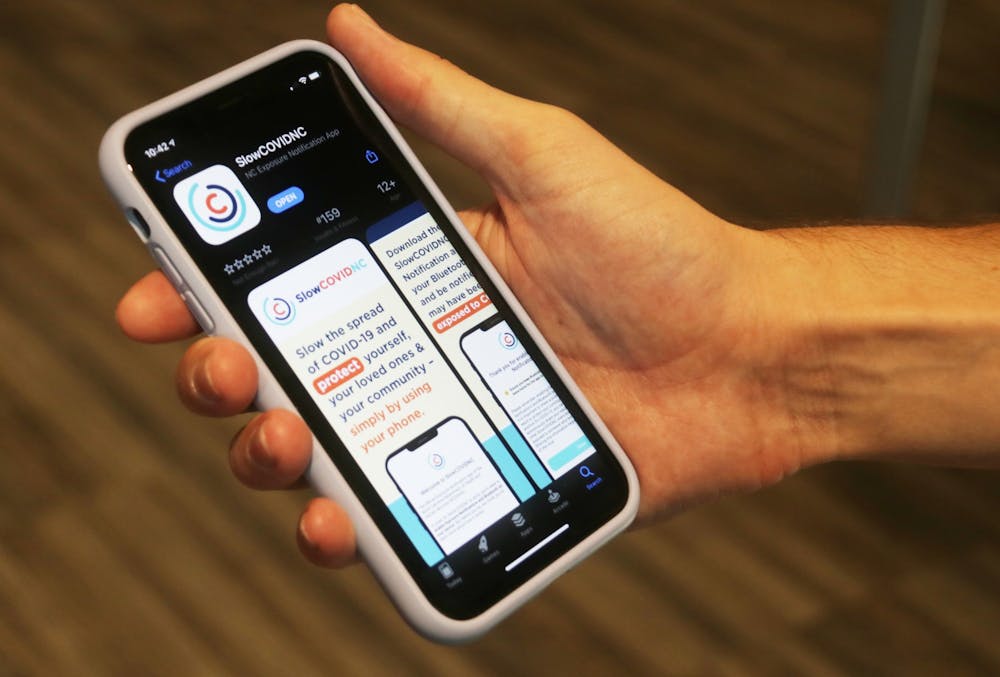Updated in Sept. 22, 2020 at 6:53 p.m. to include an interview with a NCDHHS official.
The North Carolina Department of Health and Human Services launched a statewide contact tracing app today. The app, called SlowCOVIDNC, is intended to mitigate the spread of the virus through anonymous notification of exposure to positive cases.
The app is available on the Apple App Store and Google Play Store and is compatible with iOS and Android, according to NCDHHS.
SlowCOVIDNC is voluntary to download, but will enhance current contact tracing efforts in the state, according to a NCDHHS press release earlier this month.
In a video training demonstration for the app, NCDHHS deputy chief technology officer Corey Mercy said the app is confidential for all users. The app functions using Bluetooth tokens, which he called "a string of random numbers and letters" that contain no personally identifiable information.
When Bluetooth is enabled on a phone with the app installed, the tokens can anonymously interact with other tokens in other users' phones, determining how close two users were to each other and for how long. If a user has been within six feet of someone who has tested positive for 15 minutes or more, they will receive a push notification about the close contact and will receive information regarding next steps toward testing or a 14-day quarantine.
According to NCDHHS Deputy Secretary for Technology and Operations Sam Gibbs, this close contact does not have to be continuous contact with one individual who has tested positive, but is rather a cumulative measure of exposure to positive cases.
"It could be three minutes with one phone, or five minutes with another phone but once they cumulatively have 15 minutes, then that will signal some notifications," Gibbs said, adding that users get signals every one to two hours from the state comparing Bluetooth tokens from nearby phones with individuals who have submitted positive test results.
Users can submit their own positive status through the app, but must provide a valid PIN in order to prevent "bad actors from trying to report false positives," Mercy said. This security measure was mandated in the original form of the app by Apple and Google, Exposure Notifications, according to Gibbs.
Though the app was based on the free template from Apple and Google, SlowCOVIDNC includes modifications specific to North Carolina, Gibbs said. These modifications include the incorporation of pre-existing contact tracing infrastructure in the state and different methods for obtaining the PIN in the case of a positive test result.
Exposure Notifications is currently being used by Alabama, Delaware, Nevada, North Carolina, North Dakota, Pennsylvania, Virginia, and Wyoming, according to Apple. In Virginia's version of the app, COVIDWISE, users must obtain a PIN for a positive test result verbally from a phone call with a healthcare provider, according to Gibbs. NCDHHS wanted to avoid this because of the perception that young users of the app would not answer the phone.
"We started working with the higher education institutions in North Carolina when we started to develop this, and it was pretty clear and a lot of the administrators at these colleges and universities said that their students would not likely take a call from somebody they didn't know," Gibbs said. Instead, users can obtain their PINs online.
Up to this point, local contact tracing by the Alamance County Health Department has consisted of identifying laboratory confirmed cases and relevant information to those cases, such as close contacts during the infectious period, according to the department’s public information officer Arlinda Ellison. The case investigators that find this information are public health nurses.
Once close contacts have been identified, contact tracers follow up daily with individuals in case symptoms present, Ellison wrote in a statement to Elon News Network.
While contact tracing has already been useful in managing the coronavirus pandemic in North Carolina, Gibbs said SlowCOVIDNC will help the process even more.
"Instead of it taking you know three or four potentially five days or more for someone to be contacted by phone that they've been exposed, they'll know within a day or so, via [the app]," Gibbs said.
According to Director of the Elon University News Bureau Owen Covington, Alamance County Health Department is leading Elon's current contact tracing effort. Covington said in general, once the health department is notified of an infection by a healthcare provider, they will contact the individual to identify close contacts. From there, the health department will contact the affected individuals and provide resources and support.
According to the Ready & Resilient site, when the health department becomes aware of positive cases related to the Elon community, they notify the university of individuals who test positive and related close contacts, so that Student Care and Outreach or Human Resources can contact affected students, faculty or staff via email.
Currently, Covington could not say whether or not the university will promote the use of SlowCOVIDNC as a supplement to current contact tracing procedures on campus.
According to both Gibbs and a FAQ page for Exposure Notifications, Google and Apple will disable the app "on a regional basis when it is no longer needed."
Gibbs also emphasized the convenience of the app and said the benefits would be huge.
"If everybody takes advantage of it," Gibbs said, "it could potentially help save lives by getting early notifications of people who've been exposed.


